Why Mining and Construction Giants Choose Lida Group’s Temporary Sandwich Panel Houses for Remote Site Accommodation.
2025-Sep-04 15:50:24
By Admin
Introduction
Remote mining and construction sites—whether nestled in mountainous regions, sprawling across desert landscapes, or located in isolated coastal areas—present unique challenges that test the resilience of both workers and infrastructure. Among the most critical challenges is providing safe, functional, and comfortable accommodation for large workforces operating far from urban centers. Traditional housing solutions, such as on-site brick-and-mortar buildings or basic prefabricated shacks, often fail to meet the demands of these harsh environments: they are slow to construct, vulnerable to extreme weather, costly to maintain, and difficult to relocate as projects evolve.
In response to this gap, Lida Group’s temporary sandwich panel houses have emerged as the preferred choice for mining and construction giants worldwide. These structures combine the structural integrity of high-performance sandwich panels with the flexibility of modular design, addressing the specific needs of remote site accommodation. Mining and construction companies—known for their rigorous standards and risk-averse approach—rely on Lida’s solutions to ensure worker welfare, operational efficiency, and compliance with global regulations.
This article explores the key reasons behind the widespread adoption of Lida Group’s temporary sandwich panel houses in remote mining and construction settings. It examines the unique challenges of remote site accommodation, delves into the technical and functional advantages of Lida’s sandwich panel technology, highlights real-world applications, and analyzes how the company’s solutions align with the strategic priorities of industry leaders. Finally, it concludes with insights into the future of remote site accommodation and Lida’s role in shaping it.
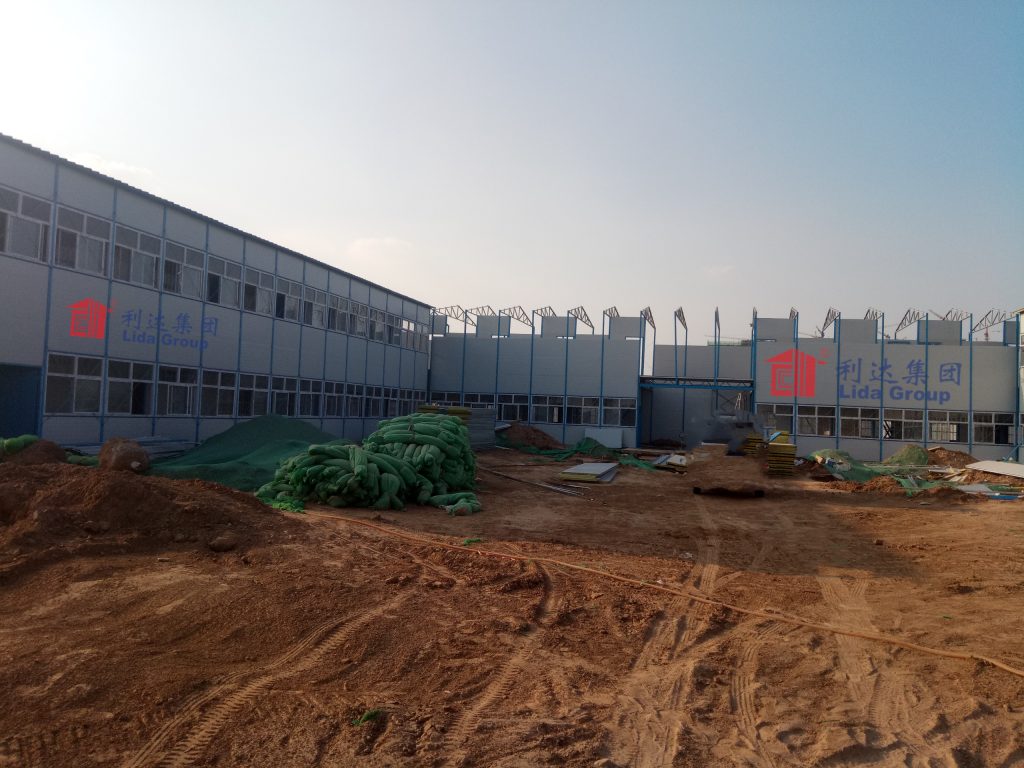
The Unique Challenges of Remote Site Accommodation
Remote mining and construction sites operate under conditions that are vastly different from urban or suburban project locations. These environments impose a set of non-negotiable requirements on accommodation solutions—requirements that traditional housing options struggle to fulfill. Understanding these challenges is essential to grasping why industry giants turn to Lida Group’s sandwich panel houses.
Extreme Environmental Conditions
Remote sites are often exposed to extreme weather: blizzards and sub-zero temperatures in northern mining regions, scorching heat and sandstorms in desert construction zones, heavy rainfall and humidity in tropical mining areas, and strong winds in coastal infrastructure projects. Traditional accommodation, such as wood-framed shacks or low-grade prefab units, lacks the insulation and structural strength to withstand these conditions. For example, uninsulated buildings in cold climates require excessive energy for heating, while poorly sealed structures in deserts allow sand to infiltrate living spaces, compromising comfort and equipment functionality.
Limited Infrastructure and Logistics
Remote sites typically lack access to established utilities (electricity, water, sewage) and transportation networks. Building permanent accommodation requires importing materials over long distances, which is costly and time-consuming. Moreover, once a mining or construction project concludes—often after 2–5 years—the accommodation becomes obsolete, as there is no local demand for it. Traditional permanent structures are then either abandoned (creating waste) or demolished (adding to project costs). This makes temporary, relocatable solutions a practical necessity.
Worker Welfare and Retention
Mining and construction companies rely on skilled and unskilled labor to operate remote sites. Poor living conditions—cramped spaces, inadequate hygiene facilities, and lack of amenities—lead to low morale, high turnover, and reduced productivity. In remote locations, where workers often spend weeks or months away from home, accommodation quality directly impacts mental and physical health. Regulatory bodies worldwide have responded by imposing stricter standards for remote worker accommodation, mandating minimum space per person, fire safety features, and access to healthcare and recreational facilities. Non-compliance can result in fines, project delays, and reputational damage.
Cost and Time Pressures
Industry giants face intense pressure to minimize project timelines and costs. On-site construction of accommodation can take 3–6 months, delaying the start of core mining or construction activities. Additionally, maintenance costs for traditional structures in remote areas are high, as replacement parts and skilled labor are difficult to source. Companies need solutions that can be deployed quickly, require minimal maintenance, and offer long-term cost efficiency.
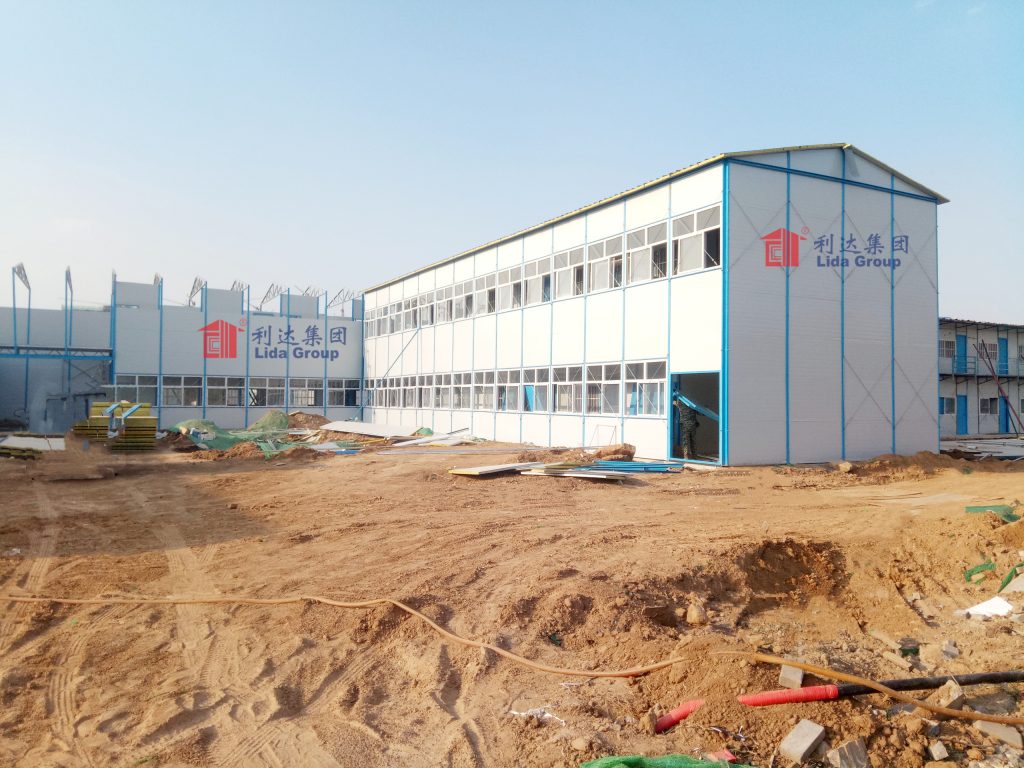
Safety and Security
Remote sites are often located in areas with limited emergency services, making safety a top priority. Accommodation must be fire-resistant, structurally sound (to withstand natural disasters), and secure (to protect workers and equipment). Traditional structures, such as wood-framed dormitories, are highly flammable, while low-quality prefab units may collapse under extreme loads—posing significant risks to worker safety.
These challenges create a demand for accommodation solutions that are durable, weather-resistant, rapid to deploy, relocatable, cost-effective, and compliant with safety and welfare standards. Lida Group’s temporary sandwich panel houses are engineered to meet all these criteria, making them the logical choice for industry leaders.
Lida Group’s Sandwich Panel Technology: The Foundation of Reliability
At the heart of Lida’s appeal to mining and construction giants is its advanced sandwich panel technology. Sandwich panels—composed of two rigid outer skins and a lightweight insulating core—offer a unique combination of strength, insulation, and durability that is unmatched by traditional building materials. Lida’s panels are specifically engineered for remote environments, with features that address the challenges outlined above.
Structural Durability for Extreme Conditions
Lida’s sandwich panels are constructed with high-grade outer skins, typically galvanized steel or aluminum, which provide exceptional structural rigidity. The steel skins are treated with anti-corrosion coatings (such as zinc or polyester) to resist rust and degradation caused by moisture, salt, and harsh chemicals—common in mining sites. The core material, chosen based on the target environment, enhances structural performance:
- Rock wool core: Offers high compressive strength and fire resistance, making it ideal for high-temperature or fire-risk sites (e.g., coal mining or oil and gas construction).
- Polyurethane (PU) foam core: Provides excellent insulation and flexibility, suitable for cold or humid regions.
- Extruded polystyrene (XPS) core: Delivers superior moisture resistance, perfect for wet or coastal environments.
Lida’s panels undergo rigorous testing to ensure they meet international structural standards, including resistance to wind loads (up to 150 km/h), snow loads (up to 1.5 kN/m²), and seismic activity (up to magnitude 8.0). This structural integrity ensures that the houses remain standing and functional even in the most extreme conditions, reducing the risk of accidents and downtime.
Superior Thermal and Acoustic Insulation
Remote sites often experience extreme temperature fluctuations, and Lida’s sandwich panels excel at maintaining a comfortable internal environment. The insulating core minimizes heat transfer, reducing the need for heating and cooling systems. For example, in sub-zero mining regions, PU foam core panels (with a thermal conductivity of 0.022 W/(m·K)) can reduce heating energy consumption by up to 50% compared to traditional uninsulated structures. In desert areas, the same panels keep interiors cool, lowering the load on air conditioning systems.
Acoustic insulation is another key benefit. Mining and construction sites are noisy, with heavy machinery, drilling, and transportation operations ongoing 24/7. Lida’s panels absorb sound, reducing noise transmission into living spaces. This improves sleep quality and mental well-being for workers, who rely on rest to perform their jobs safely.
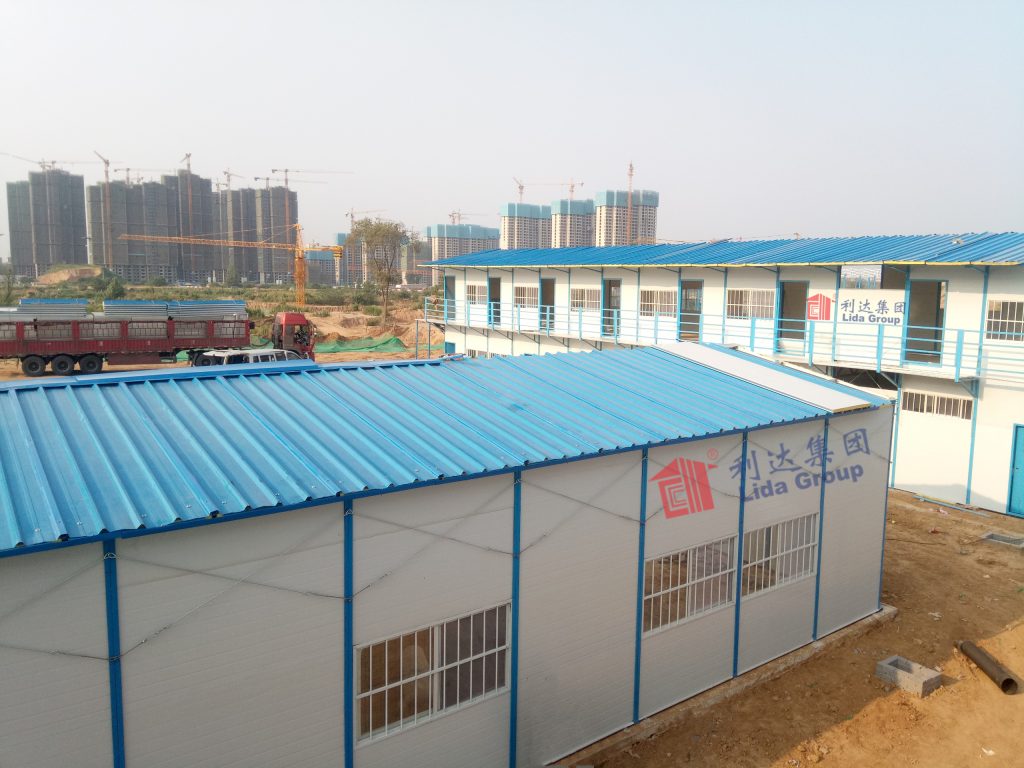
Fire and Chemical Resistance
Safety is paramount in remote sites, and Lida’s sandwich panels are engineered to meet the highest fire safety standards. Rock wool core panels are non-combustible and can withstand temperatures up to 1,000°C, preventing the spread of fire. PU and XPS core panels are treated with fire-retardant chemicals, achieving Class B or higher fire ratings in accordance with standards such as ASTM E84 (US) and EN 13501-1 (EU). Additionally, the steel skins are resistant to chemicals commonly found in mining sites (e.g., acids, alkalis), preventing corrosion and structural damage.
Lightweight and Easy to Transport
Despite their durability, Lida’s sandwich panels are lightweight, which is critical for remote site logistics. The panels weigh 8–12 kg/m², significantly less than brick (150 kg/m²) or concrete (240 kg/m²). This means they can be transported via trucks, helicopters, or even boats to inaccessible sites, without requiring specialized heavy haulage. For example, in mountainous mining regions where roads are narrow or unpaved, Lida’s panels can be transported using light trucks, reducing logistics costs and delivery times.
Quick Assembly with Minimal Labor
Remote sites often face labor shortages, so Lida’s sandwich panel houses are designed for rapid assembly with minimal skilled labor. The panels feature a tongue-and-groove system that allows for easy interlocking, and the modular design means that houses can be assembled using basic tools (drills, bolts, and cranes). A standard 50-person accommodation complex—including dormitories, bathrooms, kitchens, and recreational areas—can be assembled in 7–10 days by a small team of 4–6 workers. This is a fraction of the time required for traditional construction, allowing mining and construction companies to start operations sooner.
Modular Design: Flexibility for Evolving Remote Projects
In addition to the performance of its sandwich panels, Lida Group’s modular design approach is a key reason for its popularity among industry giants. Remote mining and construction projects are dynamic: workforce sizes fluctuate, project phases change, and sites are often abandoned once resources are extracted or construction is complete. Lida’s modular houses are designed to adapt to these changes, offering unmatched flexibility.
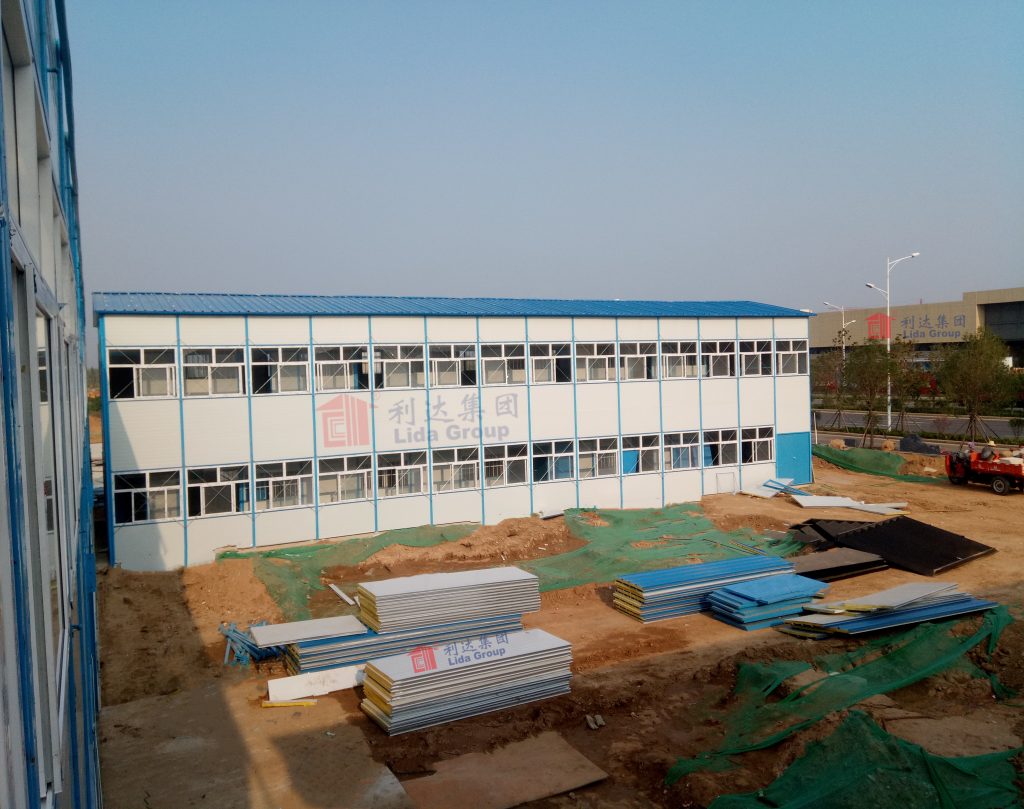
Scalable Configurations
Lida’s modular units are standardized (typically 3m × 6m or 4m × 8m) but can be easily combined to create larger structures. For example, a single module can serve as a 2-person dormitory, while four modules can be connected to form a 16-person dormitory with shared bathrooms. As workforce sizes grow, additional modules can be added without disrupting existing accommodation. This scalability is critical for mining companies, which often expand operations as new mineral deposits are discovered, or construction firms, which hire additional workers during peak project phases.
Customizable Layouts and Amenities
While the modules are standardized, Lida offers extensive customization to meet site-specific needs. Mining and construction companies can tailor layouts to include:
- Dormitories: Single, double, or multi-occupancy rooms with built-in beds, storage, and desks.
- Hygiene facilities: Showers, toilets, and laundry rooms with water-saving fixtures.
- Communal spaces: Kitchens, dining halls, and recreational areas (with TVs, seating, and reading corners).
- Functional spaces: Offices, medical clinics, and storage rooms for tools and equipment.
For example, a remote mining site in a tropical region might request modules with enhanced ventilation and mosquito screens, while a construction site in the Arctic could order units with reinforced insulation and heated floors. Lida’s ability to customize without compromising speed or cost makes its solutions adaptable to any remote environment.
Relocatable and Reusable
Unlike permanent structures, Lida’s modular sandwich panel houses are designed for relocation. When a project concludes, the houses can be disassembled, transported to a new site, and reassembled with minimal damage. The sandwich panels’ durability ensures that they retain their structural integrity through multiple relocations. This reusability reduces waste and lowers long-term costs: a single set of Lida houses can be used for 3–5 projects over 15–20 years, compared to traditional structures that are demolished after one use.
For example, a mining company that completes a 3-year project in Australia can relocate the Lida houses to a new site in Canada, avoiding the cost of building new accommodation. This flexibility aligns with the industry’s shift toward sustainability and circular economy principles.
Integration with On-Site Utilities
Remote sites often rely on alternative utilities, such as solar power, diesel generators, or rainwater harvesting systems. Lida’s modular houses are designed to integrate seamlessly with these systems. The panels can accommodate solar panels on the roof, while the modular design allows for easy installation of electrical wiring, plumbing, and HVAC systems tailored to the site’s utility infrastructure. For example, in a desert mining site with no grid electricity, Lida’s houses can be equipped with solar panels and battery storage to provide reliable power for lighting, heating, and appliances.
Cost Efficiency: Aligning with Industry’s Bottom Line
Mining and construction giants are driven by cost efficiency, and Lida Group’s temporary sandwich panel houses deliver significant savings throughout the project lifecycle. From reduced deployment time to lower maintenance costs, the financial benefits of Lida’s solutions are a key factor in their adoption.
Lower Upfront Costs
The rapid deployment of Lida’s houses reduces labor costs associated with on-site construction. Traditional accommodation requires hiring large teams of builders for months, while Lida’s modular assembly requires only a small team for a week or two. Additionally, the lightweight panels reduce transportation costs, as more units can be shipped per truck. A 2023 industry analysis found that mining companies using Lida’s houses saved an average of 25% on upfront accommodation costs compared to traditional construction.
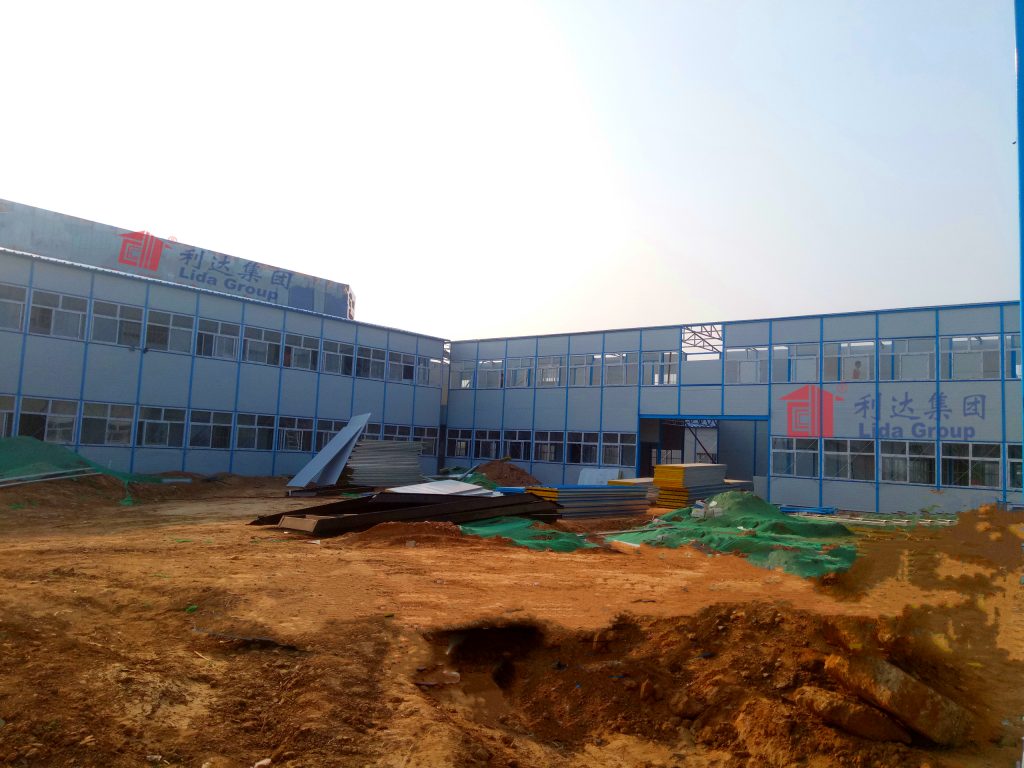
Minimal Maintenance Expenses
Lida’s sandwich panels are low-maintenance, thanks to their durable materials and resistance to environmental damage. The anti-corrosion coatings prevent rust, while the water-resistant cores reduce the risk of mold or rot. Unlike wood-framed structures, which require regular painting and repairs, Lida’s houses need only occasional cleaning and minor component replacements (e.g., door hinges or light fixtures). This reduces maintenance costs by up to 40% over the lifespan of the accommodation, a significant saving for companies operating in remote areas where maintenance labor is scarce and expensive.
Energy Savings
The superior insulation of Lida’s sandwich panels reduces energy consumption for heating and cooling. In cold regions, this translates to lower diesel costs for generators; in hot regions, it reduces the load on air conditioning systems. For example, a mining site in Siberia using Lida’s houses reported a 35% reduction in heating fuel costs compared to traditional dormitories. Over a 5-year project, these energy savings can amount to hundreds of thousands of dollars.
Resale and Relocation Value
The reusability of Lida’s houses adds to their cost efficiency. When a project ends, companies can either relocate the houses to a new site or sell them to other firms, recouping a portion of the initial investment. Traditional structures, by contrast, have no resale value and must be demolished, resulting in a total loss of upfront costs.
Compliance and Safety: Mitigating Risk for Industry Leaders
Mining and construction companies operate in a highly regulated environment, and non-compliance with safety and worker welfare standards can result in severe consequences. Lida Group’s temporary sandwich panel houses are engineered to meet or exceed global regulations, mitigating risk for industry giants.
Global Safety Standards
Lida’s houses comply with international safety standards, including:
- Fire safety: EN 13501-1 (EU), ASTM E84 (US), and GB 8624 (China) for fire resistance.
- Structural safety: ISO 12944 (corrosion resistance), AS/NZS 1170 (wind and snow loads), and FEMA 361 (seismic resistance).
- Electrical safety: IEC 60364 (electrical installations) and NEC (US National Electrical Code).
These certifications ensure that the houses meet the requirements of regulatory bodies worldwide, from the EU’s Occupational Safety and Health Administration (OSHA) to Australia’s Safe Work Australia. For multinational mining and construction companies, this compliance eliminates the need to adapt accommodation to different regional standards, simplifying project planning.
Worker Welfare Compliance
Regulatory bodies increasingly mandate high standards for remote worker accommodation, including minimum space per person, access to hygiene facilities, and recreational amenities. Lida’s houses are designed to meet these requirements:
- Minimum living space of 4 m² per worker (exceeding the 3 m² requirement in most countries).
- Separate male and female dormitories with private bathrooms.
- On-site kitchens and dining halls to ensure access to nutritious meals.
- Recreational areas to support mental health.
Compliance with these standards reduces the risk of fines and legal action, while also improving worker retention and productivity. For example, a construction company operating in Canada reported a 20% reduction in turnover after switching to Lida’s houses, citing improved living conditions as the key factor.
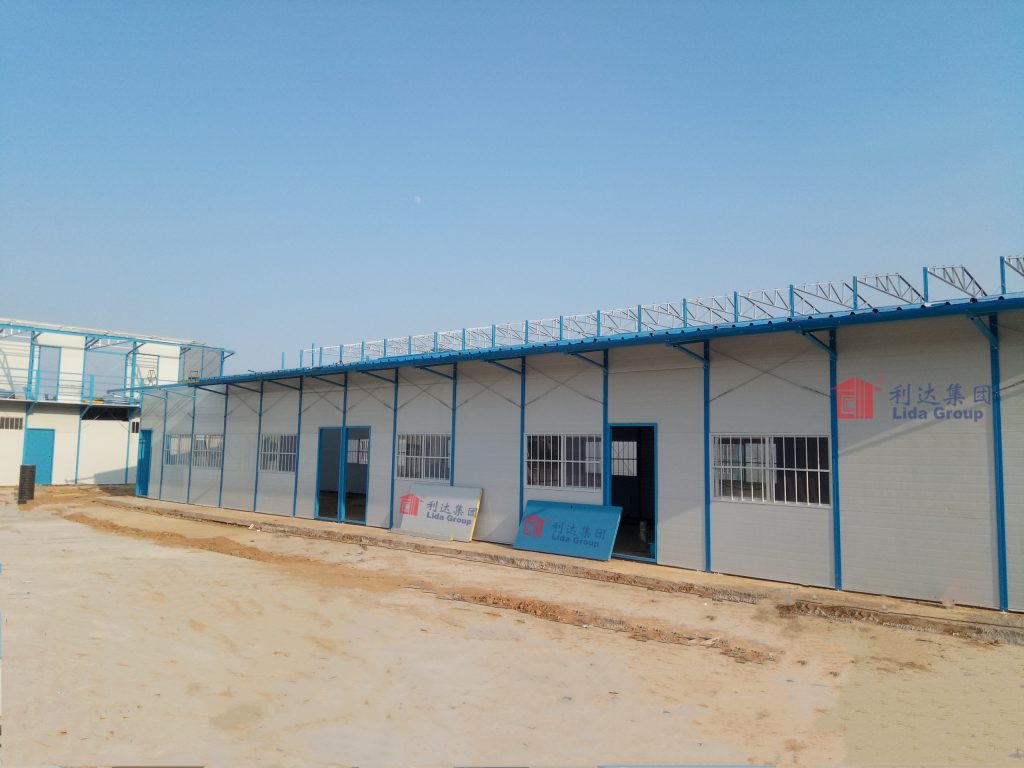
Emergency Preparedness
Remote sites are vulnerable to emergencies, such as fires, natural disasters, or medical incidents. Lida’s houses are equipped with safety features to address these risks:
- Smoke detectors, fire extinguishers, and emergency exits in every module.
- First-aid stations and medical clinics in larger accommodation complexes.
- Emergency lighting and communication systems (e.g., two-way radios) to ensure workers can call for help.
These features align with industry best practices for emergency preparedness, reducing the risk of injury or loss of life on site.
Real-World Applications: Why Industry Giants Trust Lida Group
The adoption of Lida Group’s temporary sandwich panel houses by mining and construction giants is not just theoretical—it is proven in real-world projects across the globe. The following case studies highlight how Lida’s solutions have addressed the unique challenges of remote sites.
Case Study 1: Gold Mining Project in Northern Canada
A leading global mining company needed accommodation for 300 workers at a remote gold mine in Northern Canada, where temperatures drop to -40°C in winter and blizzards are common. The company required a solution that could be deployed quickly, withstand extreme cold, and reduce heating costs.
Lida Group supplied 60 modular sandwich panel houses, featuring steel skins and PU foam cores for insulation. The houses were manufactured in Lida’s Canadian factory and transported to the site via ice roads (only accessible in winter). Assembly took 10 days, allowing the mining company to start operations on schedule. The panels’ insulation properties kept internal temperatures at 20°C even in -40°C weather, reducing heating fuel costs by 38% compared to the company’s previous accommodation. After the 5-year project concluded, the houses were disassembled and relocated to another mining site in Alaska, demonstrating their reusability.
Case Study 2: Desert Construction Project in Saudi Arabia
A multinational construction firm was awarded a contract to build a remote desalination plant in Saudi Arabia, where temperatures reach 50°C in summer and sandstorms are frequent. The firm needed accommodation for 250 workers that could withstand sand infiltration, reduce cooling costs, and be deployed within 2 weeks.
Lida provided 50 modular units with aluminum skins (resistant to sand abrasion) and XPS cores (for moisture resistance). The units
were pre-fitted with high-efficiency air conditioning systems and sand-resistant window screens. To address the lack of grid electricity, Lida integrated solar panels on the roof of each unit, supplemented by diesel generators for backup power. The modules were transported to the site via trucks and assembled in just 9 days, allowing the construction firm to meet its tight project timeline. Workers reported minimal sand infiltration and a comfortable internal temperature of 24°C, even during sandstorms. The solar panels reduced reliance on diesel by 25%, lowering operational costs and environmental impact. At the end of the 2-year project, the units were sold to another construction company working on a remote road project in Oman, retaining 60% of their initial value.
Case Study 3: Coastal Wind Farm Construction in Australia
A renewable energy company needed accommodation for 180 workers building a wind farm along Australia’s remote southern coast, where strong coastal winds (up to 120 km/h) and saltwater corrosion are major concerns. The company required accommodation that could withstand harsh coastal conditions, integrate with renewable energy systems, and be removed once construction was complete.
Lida delivered 36 modular houses with galvanized steel skins (treated with anti-corrosion coatings) and rock wool cores (for wind resistance). The units were designed to be stackable, reducing the footprint on the limited coastal land. Lida also integrated the dormitories with the wind farm’s temporary power grid, using excess wind energy to power lighting and heating. The houses were transported by barge to the remote site and assembled in 8 days. Throughout the 18-month project, the units showed no signs of corrosion, and their structural integrity held firm during severe wind events. After construction, the houses were disassembled and transported to a solar farm project in Western Australia, demonstrating their adaptability to different remote energy projects.
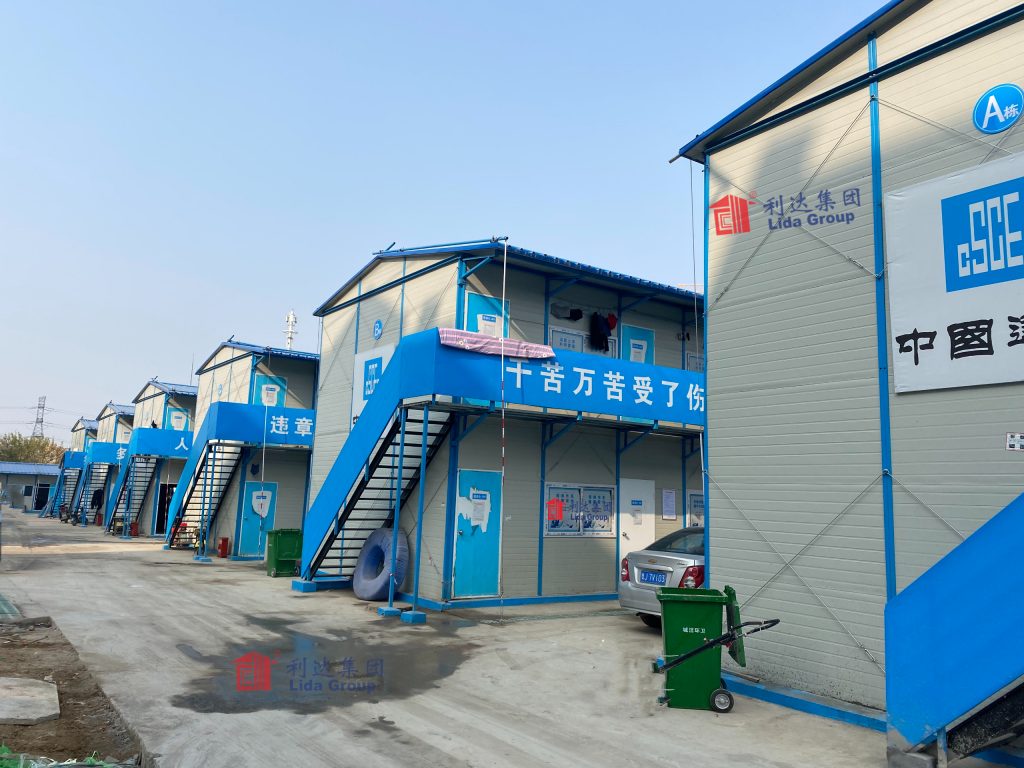
Competitive Edge: What Sets Lida Group Apart from Rivals
In a market crowded with prefabricated accommodation providers, Lida Group has established a distinct competitive edge that resonates with mining and construction giants. This edge stems from its unwavering focus on remote site-specific needs, technical innovation, and customer-centric service—factors that competitors often overlook.
Remote-First Engineering
Unlike many prefab providers that adapt urban-focused designs for remote sites, Lida engineers its sandwich panel houses specifically for extreme, isolated environments. Every component—from anti-corrosion coatings to wind-resistant joints—is tested under conditions that mimic remote mining and construction sites. For example, Lida’s research and development team operates a dedicated testing facility where panels are exposed to salt spray (for coastal sites), extreme temperature cycles (for arctic/desert sites), and simulated sandstorms (for desert sites). This remote-first approach ensures that Lida’s houses perform reliably where competitors’ products fail. Rivals often use standard materials that degrade quickly in remote conditions, leading to frequent repairs and premature replacement.
End-to-End Project Support
Lida provides comprehensive support throughout the entire project lifecycle, from initial design to final relocation or resale. This includes:
- Site Assessment: A team of engineers visits the remote site to evaluate environmental conditions (wind, temperature, corrosion risk) and logistical constraints (transportation access, utility availability), ensuring the solution is tailored to the site’s unique needs.
- Logistics Coordination: Lida manages the transportation of modules to even the most inaccessible sites, partnering with local logistics firms to navigate challenging terrain (e.g., mountain roads, ice tracks, coastal waters).
- On-Site Training: Lida’s technicians train the client’s team on assembly, maintenance, and emergency procedures, ensuring self-sufficiency in remote locations where external support is scarce.
- Post-Project Services: Assistance with disassembly, relocation, or resale of units, maximizing the client’s return on investment.
Competitors typically offer limited support, leaving clients to manage logistics, assembly, and disposal on their own—a significant burden in remote areas.
Customization Without Compromise on Speed
While many prefab providers charge a premium for customization or require extended lead times, Lida delivers tailored solutions without sacrificing speed. Its standardized modular framework allows for quick adjustments to layout, materials, and amenities, as the core structure remains consistent. For example, a mining client needing explosion-proof electrical systems for a coal mine can have these integrated into standard modules within the same 4-week manufacturing timeline as a non-specialized order. This balance of customization and speed is critical for remote projects, where site conditions often demand unique solutions but timelines cannot be extended.
Transparent Costing and Long-Term Value
Lida provides transparent, detailed cost estimates that include not just upfront manufacturing and delivery costs, but also long-term expenses such as maintenance, energy, and relocation. This allows mining and construction companies to make informed decisions based on total lifecycle cost, rather than just upfront price. Rivals often hide hidden costs (e.g., for customization, transportation to remote sites) or focus solely on low upfront prices, which mask higher long-term expenses. Lida’s focus on total value aligns with the strategic planning of industry giants, which prioritize cost predictability and long-term efficiency.
Future Trends and Lida’s Strategic Vision
The remote site accommodation market is evolving, driven by advances in technology, stricter sustainability regulations, and a growing focus on worker well-being. Lida Group is positioning itself to lead these changes, with a strategic vision that builds on its core strengths while embracing innovation.
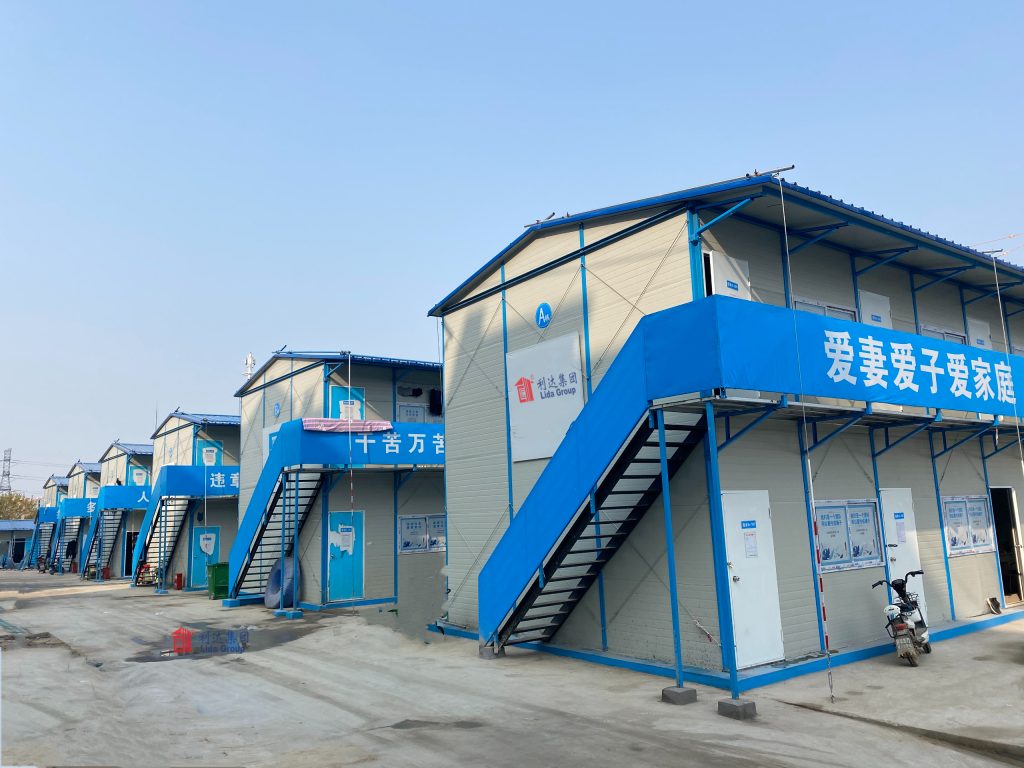
Advancements in Sustainable Materials
Lida is investing in the development of more sustainable sandwich panel materials to align with the mining and construction industry’s net-zero goals. One key initiative is the use of recycled steel for panel skins, reducing the carbon footprint of manufacturing by 30%. The company is also testing bio-based PU foam cores made from agricultural waste, which offer the same insulation properties as traditional foam but are fully biodegradable. Additionally, Lida is exploring hemp-based insulation cores, which are renewable, fire-resistant, and have excellent thermal performance. These materials are expected to be integrated into production by 2027, making Lida’s houses even more attractive to companies with aggressive sustainability targets.
Smart Remote Monitoring Systems
To enhance the efficiency and safety of remote accommodation, Lida is integrating smart monitoring systems into its modular houses. These systems use IoT sensors to track:
- Structural health: Vibrations, temperature changes, and corrosion levels, alerting maintenance teams to potential issues before they escalate.
- Energy usage: Real-time data on electricity, heating, and cooling consumption, allowing for optimization of energy systems.
- Worker safety: Occupancy levels, air quality, and emergency alerts, enabling rapid response to incidents.
The data is transmitted to a central cloud platform, accessible to project managers via a mobile app—even in remote areas with limited connectivity (using satellite communication where necessary). This smart technology reduces the need for on-site maintenance visits, lowers operational costs, and improves worker safety. Lida plans to make smart monitoring a standard feature in all its remote accommodation solutions by 2026.
Expansion of Local Manufacturing Hubs
To reduce transportation costs and delivery times for remote sites worldwide, Lida is expanding its network of local manufacturing hubs. The company currently operates factories in China, Canada, Germany, and Australia, and plans to open new facilities in Brazil (to serve South American mining sites) and South Africa (to cater to African construction and mining projects) by 2028. These local hubs will manufacture panels and modules using regionally sourced materials, reducing carbon emissions from transportation and enabling faster delivery to nearby remote sites. They will also allow Lida to better understand regional regulations and customer needs, further enhancing customization.
Focus on Worker Well-Being Technology
Recognizing the growing importance of worker mental health in remote sites, Lida is integrating technologies designed to improve well-being. Future modular houses will include:
- Natural light optimization: Smart windows that adjust to maximize natural light, which has been shown to boost mood and sleep quality.
- Noise-canceling systems: Advanced acoustic insulation combined with active noise-canceling technology to reduce the impact of site noise.
- Wellness spaces: Dedicated modules for fitness, meditation, and virtual communication with family (equipped with high-speed satellite internet).
These features reflect Lida’s understanding that worker well-being is not just a regulatory requirement but a key driver of productivity and retention—an insight that resonates with mining and construction giants focused on long-term operational success.
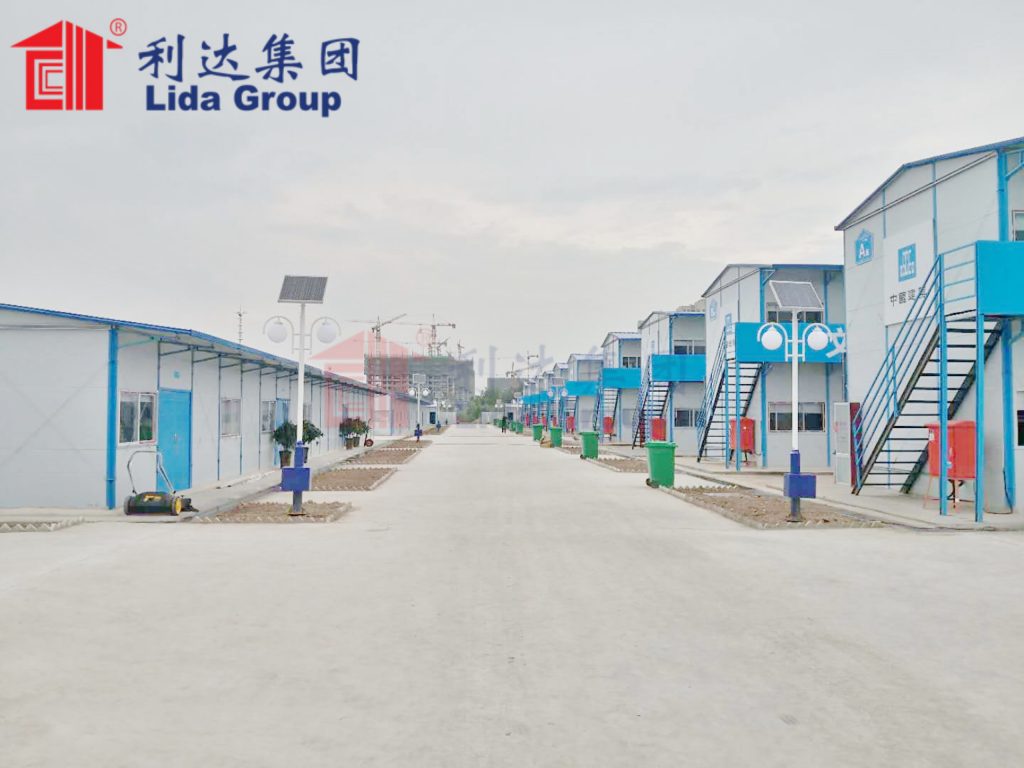
Conclusion
Mining and construction giants choose Lida Group’s temporary sandwich panel houses for remote site accommodation because they represent a rare combination of reliability, flexibility, cost efficiency, and compliance—all tailored to the unique challenges of isolated, harsh environments. Traditional accommodation solutions fail to meet the demands of remote sites, but Lida’s offerings address every critical need: durability in extreme weather, rapid deployment to meet tight timelines, reusability to reduce costs and waste, and compliance with global safety and welfare standards.
At the core of Lida’s success is its advanced sandwich panel technology, which delivers structural strength, insulation, and resistance to corrosion and fire—properties that are non-negotiable in remote locations. Complemented by a modular design that allows for scalability, customization, and relocation, Lida’s houses adapt to the dynamic needs of mining and construction projects. Real-world case studies from Canada, Saudi Arabia, and Australia demonstrate that these solutions are not just theoretical but proven to deliver tangible benefits, from reduced energy costs to improved worker retention.
Lida’s competitive edge—built on remote-first engineering, end-to-end support, transparent costing, and a focus on total value—sets it apart from rivals. The company’s strategic vision, which embraces sustainable materials, smart technology, and worker well-being, ensures that it will continue to lead as the remote accommodation market evolves.
For mining and construction giants, choosing Lida Group is more than a purchasing decision—it is a strategic investment in operational efficiency, risk mitigation, and worker welfare. In an industry where remote site success depends on reliable infrastructure, Lida’s temporary sandwich panel houses have become an indispensable tool for companies aiming to thrive in the world’s most challenging environments. As the demand for remote mining and construction projects grows, Lida Group is poised to remain the partner of choice for industry leaders committed to safety, sustainability, and success.
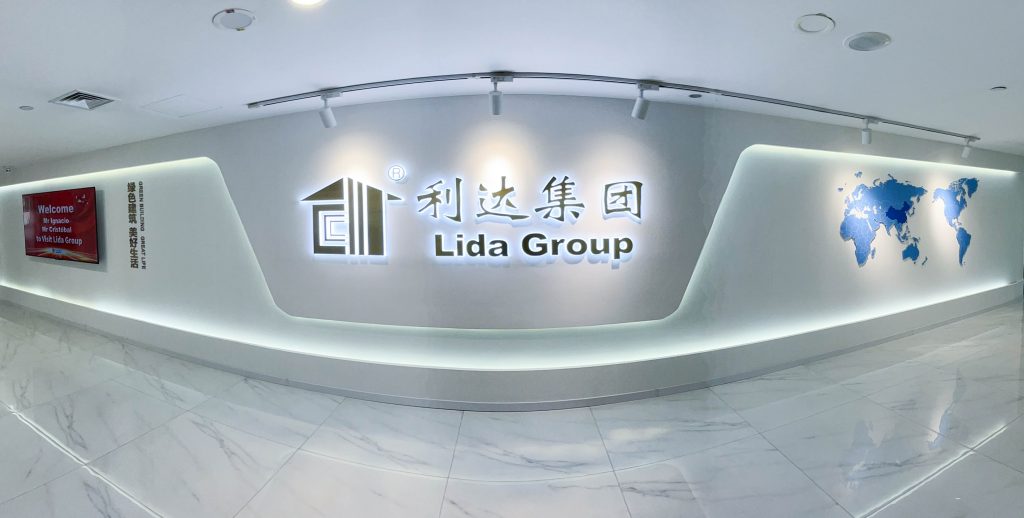
Related news
-
Prefab Worker's Dormitory Solutions by Lida Group Combine the Durability of Sandwich Panels with Mobile Convenience
2025-09-04 15:29:15
-
Lida Group Sets a New Benchmark for Rapid Deployment with Its High-Quality Mobile Building Worker Dormitories
2025-09-02 17:37:17
-
The Future of On-Site Accommodation: Smart Technology Integration in Lida Group's Prefab Building Container House Units.
2025-08-27 17:32:34
contact us
- Tel: +86-532-88966982
- Whatsapp: +86-13793209022
- E-mail: sales@lidajituan.com


